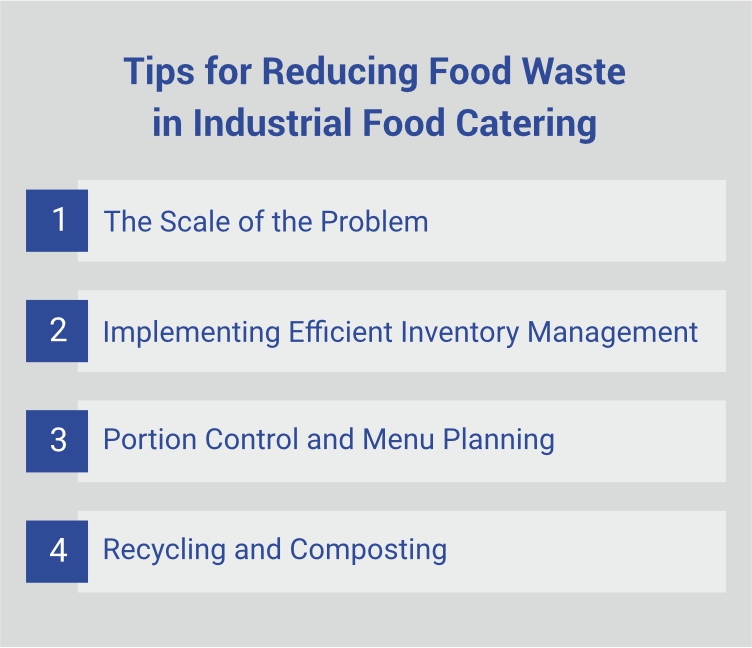Introduction:
In today's world, sustainability has become a pivotal concern across industries, including food services. Industrial food catering, a sector responsible for feeding large populations daily, holds significant potential to implement sustainable practices. These practices not only reduce environmental impact but also enhance operational efficiency and appeal to eco-conscious clients. This blog explores the key strategies for reducing food waste and carbon footprint, along with the importance of sourcing local and organic ingredients in the realm of industrial food catering.
Reducing Food Waste in Industrial Food Catering

1. The Scale of the Problem:
Food waste is a critical issue in the catering industry, with industrial food services in India contributing significantly to this problem. Wasted food not only squanders resources but also generates substantial greenhouse gas emissions when decomposed in landfills. Addressing food waste in industrial catering is, therefore, an essential step towards sustainability.
2. Implementing Efficient Inventory Management:
Effective inventory management is crucial in reducing food waste. Industrial food catering services in India can leverage technology to track inventory levels accurately, predict demand, and avoid over-purchasing. This approach minimizes the risk of surplus food that often leads to waste.
3. Portion Control and Menu Planning:
Strategic menu planning and portion control play vital roles in waste reduction. By designing menus that use ingredients efficiently and offering portion sizes that match customer consumption patterns, catering services can significantly cut down on leftovers and food disposal.
4. Recycling and Composting:
Implementing recycling and composting programs is another effective way to manage food waste. Leftover food and kitchen scraps can be composted to create nutrient-rich soil, reducing waste sent to landfills and supporting sustainable agricultural practices.
Reducing Carbon Footprint in Industrial Catering
1. Energy-Efficient Equipment:
Utilizing energy-efficient kitchen appliances and equipment is a straightforward method to reduce the carbon footprint of catering operations. Modern appliances consume less energy, thereby decreasing overall greenhouse gas emissions. Industrial food catering services in India can invest in energy-efficient ovens, refrigerators, and lighting systems to enhance sustainability.
2. Transportation and Logistics:
The logistics involved in sourcing ingredients and delivering meals contribute significantly to carbon emissions. Catering services can reduce their carbon footprint by optimizing delivery routes, consolidating shipments, and using fuel-efficient vehicles. Furthermore, partnering with local suppliers can shorten supply chains and reduce transportation-related emissions.
3. Waste-to-Energy Initiatives:
Waste-to-energy technologies offer innovative solutions to reduce the carbon footprint of industrial food catering. These systems convert organic waste into biogas or electricity, providing a renewable energy source and reducing reliance on fossil fuels. Implementing such initiatives can significantly enhance the sustainability profile of catering operations.
Sourcing Local and Organic Ingredients
1. Benefits of Local Sourcing:
Sourcing local ingredients is a key strategy for sustainable food services in India. Local sourcing reduces the environmental impact associated with long-distance transportation and supports local economies. By partnering with nearby farmers and producers, catering services can ensure fresher ingredients, lower transportation costs, and reduce carbon emissions.
2. Promoting Organic Farming:
Organic farming practices avoid the use of synthetic fertilizers and pesticides, promoting soil health and biodiversity. By sourcing organic ingredients, industrial food catering services contribute to sustainable agriculture and provide healthier meal options. Organic produce is often perceived as higher quality, enhancing the overall dining experience.
3. Supporting Fair Trade:
In addition to local and organic sourcing, supporting fair trade practices ensures that farmers and producers receive fair compensation for their labour. This ethical approach aligns with the broader goals of sustainability, fostering a more equitable food system and promoting social responsibility within the catering industry.
Case Studies and Best Practices
Success Stories in Sustainable Catering:
Several industrial food catering services in India have successfully implemented sustainable practices. For instance, companies that have adopted zero-waste kitchens, sourced ingredients locally, and invested in renewable energy sources have seen significant reductions in their environmental impact. These success stories serve as inspiring examples for other catering services aiming to adopt sustainable practices.
Collaboration with Stakeholders
Collaborating with various stakeholders, including clients, suppliers, and local communities, is crucial for the successful implementation of sustainable practices. By engaging stakeholders in sustainability initiatives, catering services can build stronger relationships, enhance their reputation, and achieve greater impact.
Challenges and Solutions
Overcoming Barriers to Sustainability:
Despite the clear benefits, adopting sustainable practices in industrial food catering can present challenges. These may include higher initial costs, resistance to change, and limited availability of local or organic ingredients. However, these challenges can be overcome through strategic planning, education, and leveraging government incentives for sustainable practices.
Role of Technology:
Technology plays a vital role in overcoming these challenges. From inventory management systems and data analytics to energy-efficient kitchen equipment and waste-tracking tools, technology provides numerous solutions for enhancing sustainability in catering operations.
Conclusion
Sustainability in industrial food catering is no longer a choice but a necessity. By focusing on reducing food waste and carbon footprint, and by sourcing local and organic ingredients, catering services can play a crucial role in building a more sustainable food system. The integration of these practices not only benefits the environment but also enhances the efficiency and profitability of catering operations. As the demand for sustainable food services in India continues to grow, industrial food catering companies that embrace these practices will be well-positioned to lead the industry towards a greener future.
In conclusion, the journey towards sustainability requires commitment, innovation, and collaboration. By adopting sustainable practices, industrial food catering services in India can make a significant positive impact on the environment while meeting the growing expectations of eco-conscious clients.
Industries we serve:
Automobile | Manufacturing | Pharmaceutical | Oil and Gas | Healthcare | Ancillary | FMCG | Education | Real Estate | Commercial | Mining | Hotels
Also read: Health and Wellness Programs in Industrial Catering

